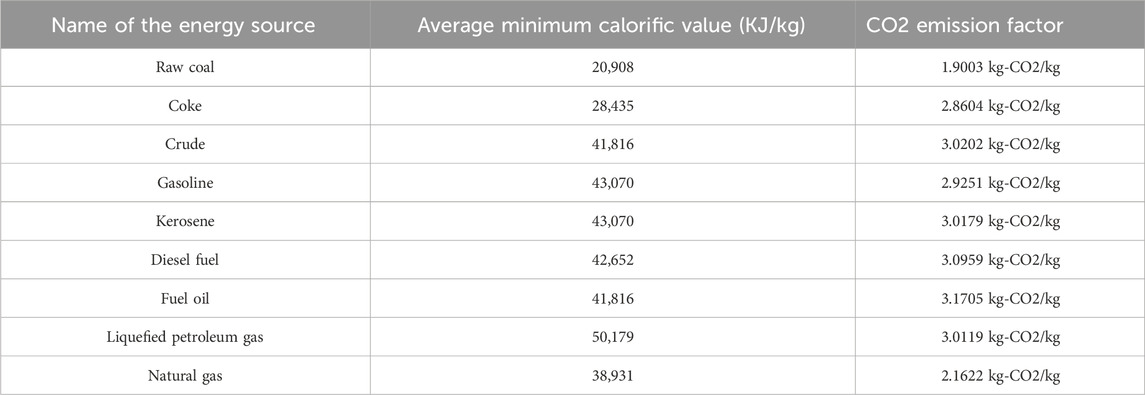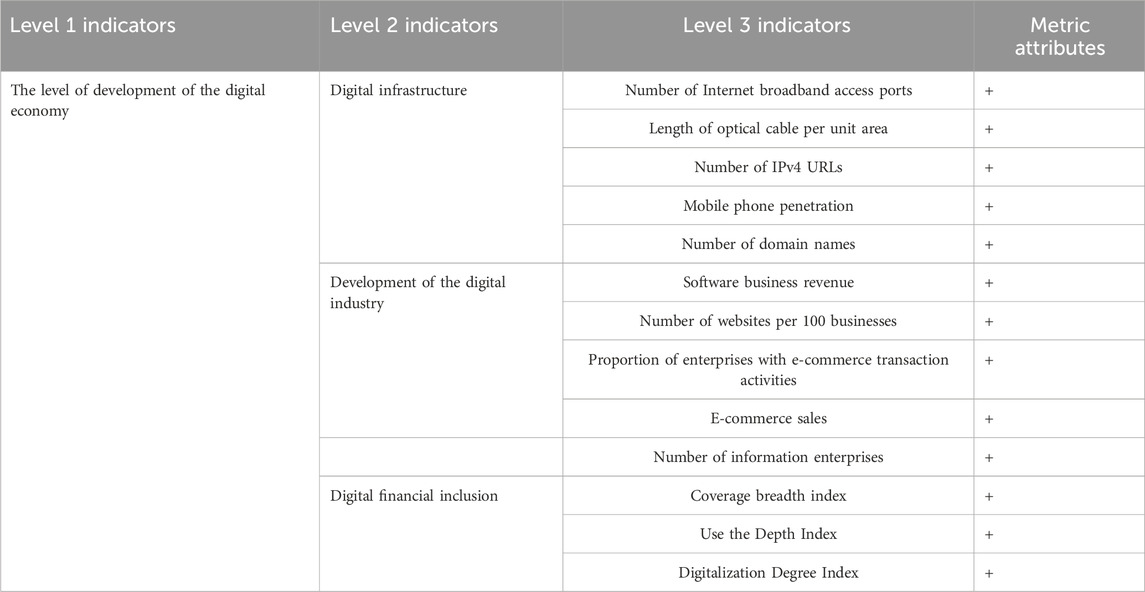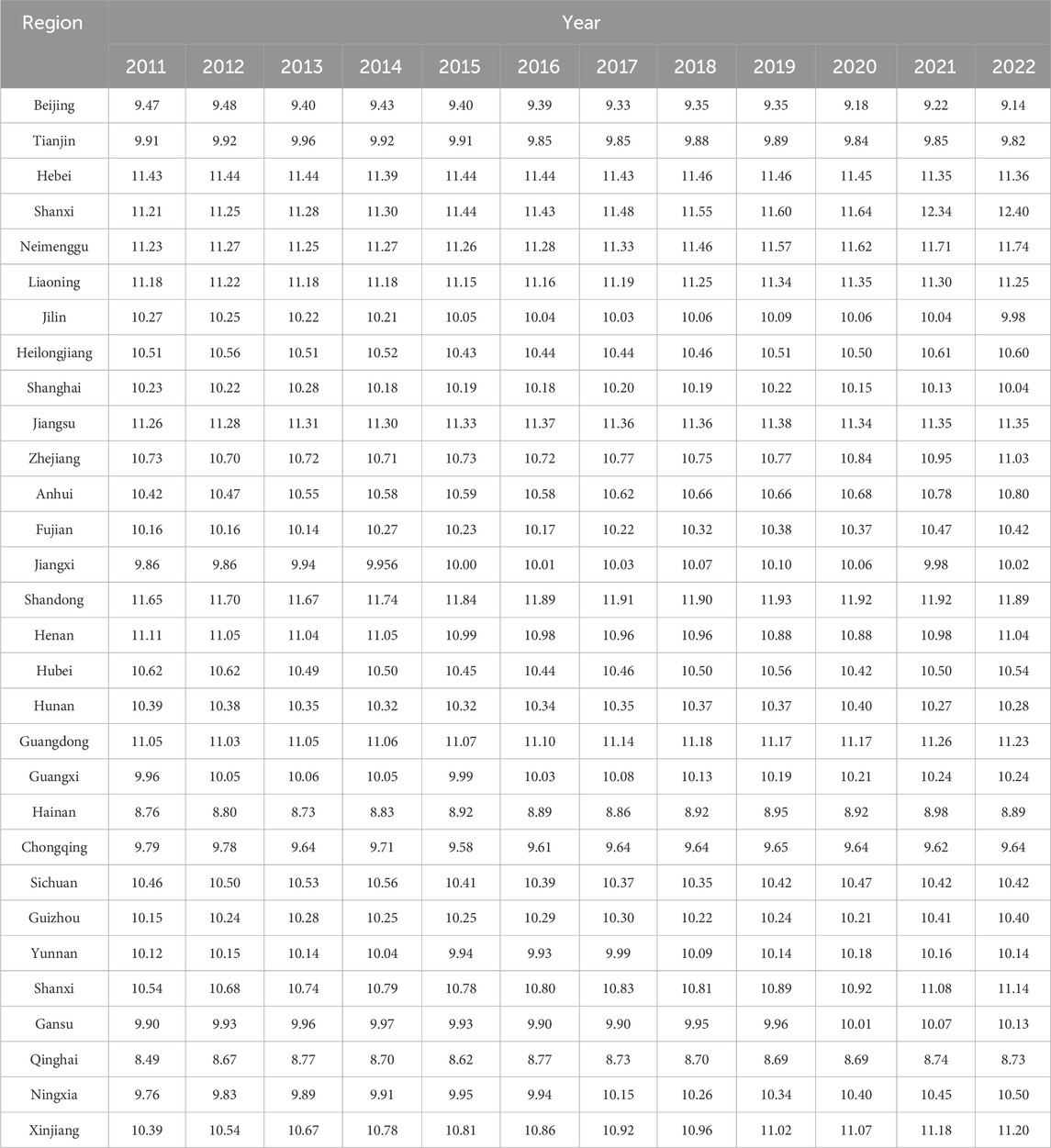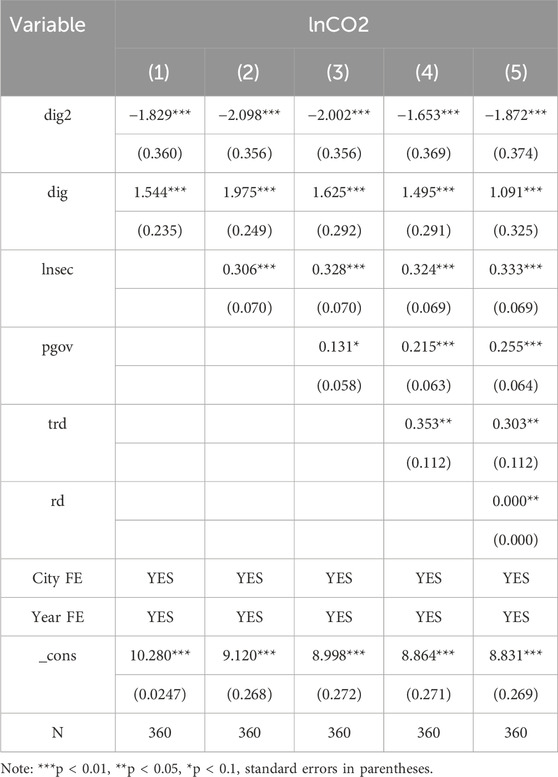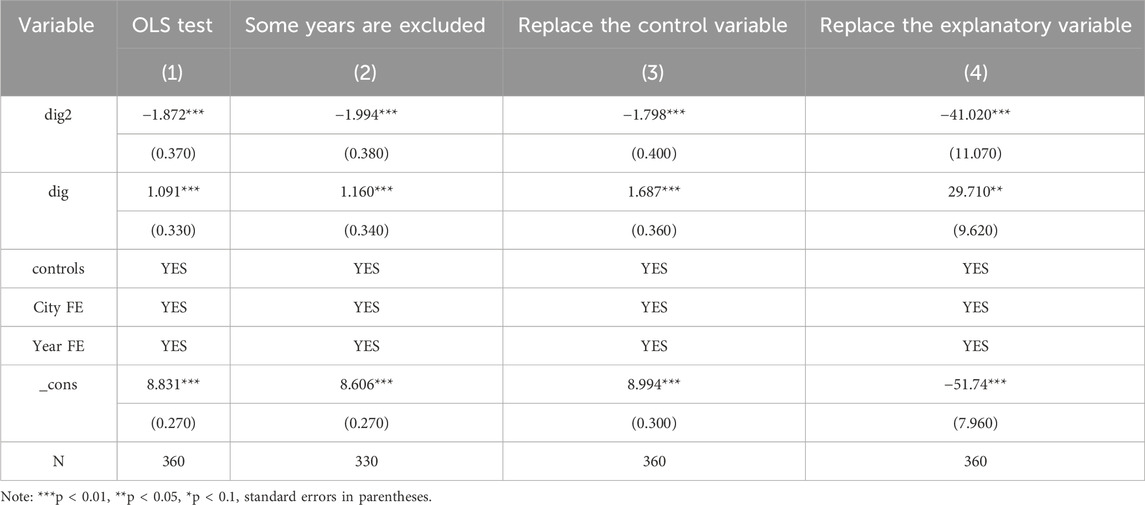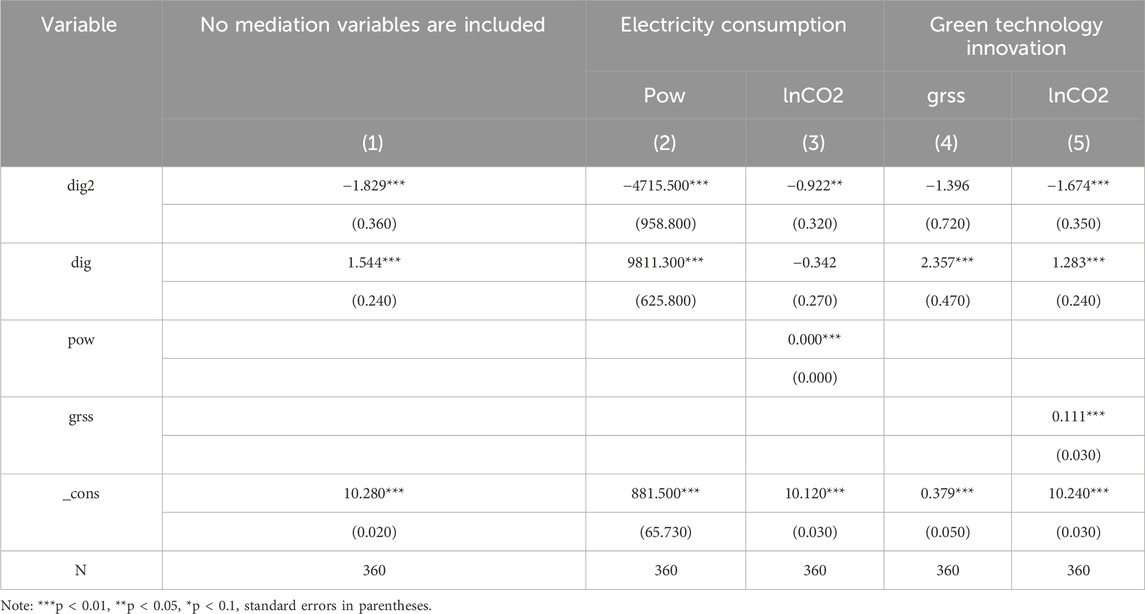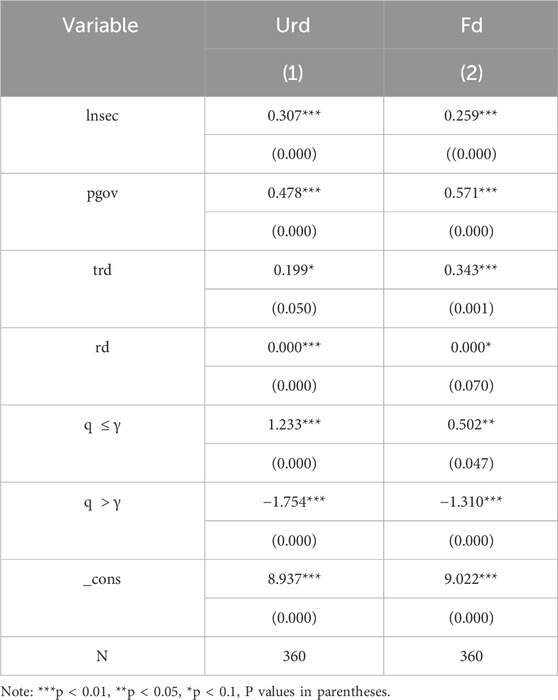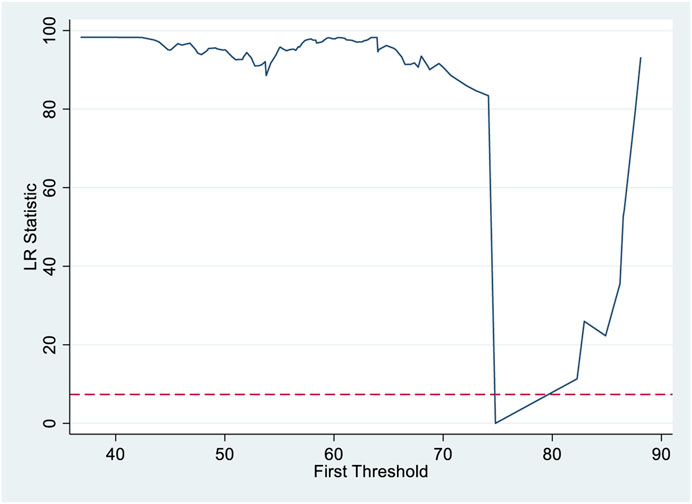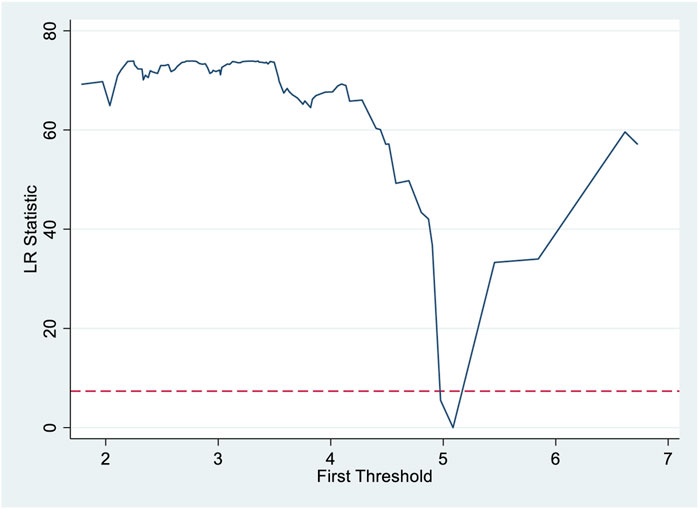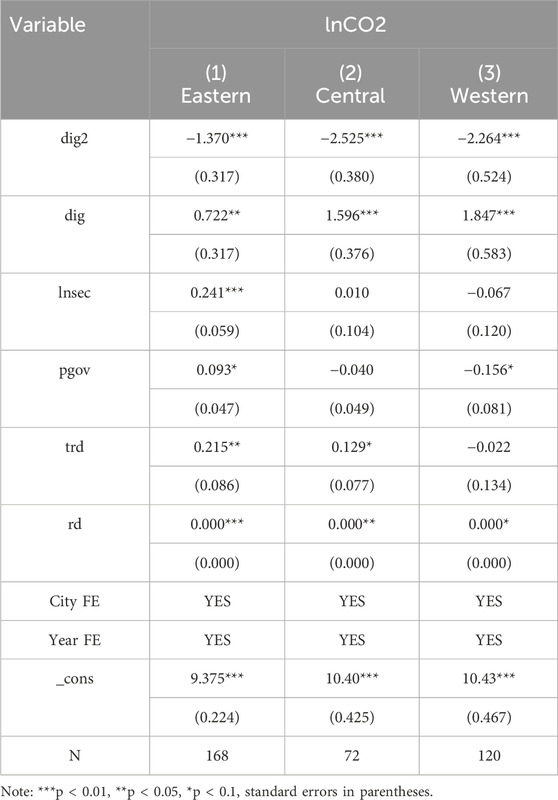- School of Economics, Wuhan Business University, Wuhan, China
Against the backdrop of urban green low-carbon transformation and AI-empowered digital economy development, examining the impact of digital economy on carbon emissions has become a crucial research topic. This study employs the entropy weight method to calculate the digital economy development index, utilizing mediation effect models and threshold regression models to empirically analyze the impact and mechanisms of digital economy on carbon emissions. The results reveal that: (1) An inverted U-shaped relationship exists between digital economy development and carbon emissions, with initial increases followed by decreases after reaching a certain value; (2) Electricity consumption and green technology innovation serve as mediation mechanisms; (3) Digital economy can effectively curb emissions when urbanization and financial development surpass certain threshold levels. Based on these research findings, this study proposes targeted policy recommendations that make substantive contributions to low-carbon sustainable development.
1 Introduction
According to the Global Carbon Budget 2024 report, global CO2 emissions are projected to reach a record high of 41.6 billion tons in 2024, marking an increase of 1 billion tons compared to 2023. Notably, CO2 emissions from global fossil fuel combustion are expected to grow by 0.8%, reaching 37.4 billion tons. Without effective emission reduction measures, global temperatures will continue to rise, exacerbating climate change impacts. In response, numerous countries have committed to addressing carbon emissions. For instance, developed economies such as the United States, the European Union, and Japan have implemented policy frameworks to support their renewable energy sectors, achieving measurable progress. The vigorous development of renewable energy represents a critical pathway for China to resolve its energy and environmental challenges while fulfilling its international commitments (Ma and Zhang, 2025). At the 75th United Nations General Assembly in September 2020, China announced its “3,060” dual-carbon targets, pledging to peak CO2 emissions by 2030 and achieve carbon neutrality by 2060, thereby demonstrating its responsibility in addressing global warming.
In the search for carbon reduction solutions, technological revolutions are creating global opportunities for emission mitigation, with digital strategies emerging as a key focus in recent years. The accelerated global digital transformation has positioned the digital economy as a pivotal driver of economic growth and social development. Simultaneously, the digital economy has reshaped the energy consumption patterns of economic growth, establishing a complex interplay with carbon emissions. On the one hand, digital technologies offer new possibilities for emission reduction through resource optimization, energy efficiency improvements, and low-carbon innovation. On the other hand, the rising energy demand from digital infrastructure presents new challenges for carbon mitigation.
Consequently, scholars have begun investigating the impact of digital economy development on carbon emissions. Some studies argue that the digital economy can significantly reduce urban carbon intensity through structural optimization, technological innovation, and improved resource allocation. However, other researchers contend that the relationship between digital economy development and carbon intensity is not linear but rather follows an inverted U-shaped pattern. These inconsistent findings may stem from biased indicator selection in measuring digital economy development and fragmented explorations of underlying mechanisms.
To address these gaps, this study examines the impact of digital economy development on provincial-level carbon emissions in China, with a focus on mediating mechanisms and threshold effects. The innovative contributions are: (1) Theoretically, we employ mediation and threshold analyses to reveal underlying mechanisms, moving beyond conventional relationship testing; (2) Empirically, we innovate through novel digital economy indicators and threshold variables; (3) Methodologically, we enhance reliability by using entropy weighting for index construction and bias-corrected bootstrap for mediation analysis.
2 Literature review
2.1 The relationship between the digital economy and carbon emissions
The current literature presents three distinct perspectives regarding the digital economy’s impact on carbon emissions, with each perspective supported by multiple empirical studies. On the positive side, the development of the digital economy and digital technologies has had a significant positive impact on reducing carbon emissions (Ma and Zhang, 2025). Studies consistently demonstrate digitalization’s carbon reduction potential through multiple pathways, as shown by Mei et al. (2023) through their 100-country study identifying key moderating factors. Subsequent research by Li et al. (2024a) on digital trade and (Zhang et al., 2022a) on urban applications revealed sector-specific mechanisms, with (Yi et al., 2022) highlighting structural transformation potential and (Zhang C. et al., 2024; Zhang Y. et al., 2024) documenting firm-level efficiency gains. However, Jiang et al. (2024) identified important threshold effects where initial benefits may stabilize, and spatial analyses by Wang and Zhong (2023), Zuo et al. (2024), Kuang et al. (2024), and Xia et al. (2025) revealed significant regional variations, demonstrating that digitalization’s environmental outcomes depend critically on local contextual factors, as emphasized by Yi et al. (2022) in their examination of developmental disparities. This body of research collectively underscores both the promise and complexity of digital solutions for climate mitigation, highlighting the need for context-sensitive implementation strategies that account for regional characteristics and development stages.
On the negative side, the literature presents compelling evidence that digital economy development may exacerbate carbon emissions through multiple pathways, creating significant environmental challenges that offset its potential benefits. Wang et al. (2024a) established that the digital economy’s expansion creates substantial new energy demands, particularly through energy-intensive infrastructure like data centers and telecommunications networks. This finding was empirically validated by Che et al. (2024) in their comprehensive analysis of panel data from 83 countries (2005–2021), which demonstrated how digital infrastructure construction significantly increased carbon emissions globally, with particularly pronounced effects in Europe and Asia-Pacific regions. Raihan (2024) further contextualized these findings by highlighting the growing sustainability challenges posed by high-performance digital equipment and data-intensive facilities. Hittinger and Jaramillo (2019) systematically analyzed the energy consumption patterns of digital technologies, while (Salahuddin and Alam, 2015) provided concrete evidence from Australia showing how digital technology adoption drives electricity consumption and consequent emissions. These patterns were confirmed in Asian contexts by Usman et al. (2021), who found information technology use increased emissions across nine major Asian economies, with effects intensifying over time. The financial dimension was explored by Khan et al. (2023) across 76 emerging markets, and (Arshad et al., 2020) provided comparative analysis of Asian economies, both revealing significant variations between developed and developing nations. Importantly, several studies identified counterintuitive mechanisms where digitalization’s benefits may be offset by unintended consequences. Kunkel and Tyfield (2021) documented the rebound effect, where efficiency improvements spur greater overall energy consumption. Dong et al. (2022) found that while digitalization reduces carbon intensity, it may still increase per capita emissions. These complexities were further illustrated by Jiang et al. (2021) through their analysis of blockchain technology’s operational emissions, and reinforced by Hittinger and Jaramillo (2019) examination of IoT devices’ energy impacts. Collectively, without parallel transitions to clean energy, digital economy growth may inadvertently exacerbate carbon emissions despite its efficiency-enhancing potential.
The relationship between the digital economy and carbon emissions may not be linear, but rather inverted U-shaped, as pointed out by the bibliometric study by Liu and Wang (2025). The further development of the digital economy may lead to a reduction in carbon emissions and intensity after a critical inflection point (Bai et al., 2023; Zheng et al., 2023). This pattern has been consistently validated across diverse contexts: (Zhang Z. et al., 2024) confirmed it through their 72-country analysis while highlighting the synergistic effects of industrial upgrading and energy efficiency that emerge post-inflection point, and (Wang Q. et al., 2023) replicated these findings in their 67-nation study (2005–2019). Spatial analyses reveal important variations, with Ma et al. (2025) demonstrating earlier inflection points in developed Chinese cities compared to less developed ones, while Higón et al. (2017) found developing nations require higher digital economy maturity to reach their inflection points than developed countries. Li and Wang (2022) further quantified regional differences within China, showing eastern areas’ inflection point is different from central and western regions. While Ma and Zhang (2025) caution that this framework may underestimate potential rebound effects, subsequent refinements by Zheng et al. (2023) and Bai et al. (2023) have strengthened the model by analyzing post-inflection emission reduction dynamics. These collective findings, supported by Zhang Z. et al. (2024) and Wang Q. et al. (2023) longitudinal evidence, confirm that while the exact inflection point varies contextually, the transition to net environmental benefits becomes increasingly pronounced as digital economies mature beyond critical development thresholds.
2.2 Mechanisms of digital economy’s impact on carbon emissions
Research has systematically identified three key transmission channels through which digital economy development affects carbon emissions. The energy efficiency pathway has been extensively documented, beginning with (Huang and Lin, 2024a) provincial-level analysis demonstrating how digital technologies enable precise energy monitoring and waste reduction. This finding was reinforced by Ma and Lin (2023) through fixed-effect models showing reduced energy intensity in industrial production, while (Mei et al., 2023) expanded the framework to include energy structure optimization.
Parallel evidence reveals the industrial transformation mechanism. Dian et al. (2024) first established how digitalization drives industrial upgrading toward greener sectors, a process further examined by Wang H. et al. (2023) through its impact on reducing energy-intensive dependencies. Zhang C. et al. (2024) provided micro-level validation in manufacturing, while Xia et al. (2025) confirmed these patterns across 269 Chinese cities, identifying energy efficiency as the dominant mediating channel.
The innovation pathway has been robustly established in the literature. Wang et al. (2025) identify both the digital economy and technological innovation as “potential key drivers” of sustainable development. This builds upon earlier foundational work by Lee et al. (2022), who demonstrated the critical role of information and communication technologies (ICT) in facilitating renewable energy innovation. Subsequent studies by Tao et al. (2024) and Shen et al. (2024) provided micro-level evidence, revealing how corporate digital transformation accelerates green technology development through enhanced R&D investment and innovative production processes. Importantly, Wang et al. (2023) further expanded this understanding by empirically validating the spatial interdependence between digital economy development, open innovation systems, and green low-carbon transitions, highlighting the multi-dimensional nature of innovation-driven emission reduction pathways. These studies collectively demonstrate that digitalization reduces emissions through simultaneous improvements in operational efficiency, structural transformation, and technological innovation.
2.3 Threshold effects of digital economy’s impact on carbon emissions
The threshold effect of economic development level on the digital economy’s carbon emission reduction has been examined in existing research. Wang et al. (2024a) employed threshold regression modeling using per capita GDP as the economic development indicator, revealing that once economic development surpasses a specific threshold, the digital economy’s inhibitory effect on carbon emissions becomes substantially stronger. This enhanced effect stems from greater resource availability in more developed regions, allowing for increased investment in digital technology R&D and implementation, thereby maximizing the digital economy’s low-carbon potential. Complementing these findings, Hwang and Venter (2025) demonstrated that in economically advanced regions, the synergistic interaction between digital economy development and institutional quality creates particularly favorable conditions for low-carbon energy transitions and emission reductions, underscoring how economic development level serves as a fundamental enabler for realizing the digital economy’s environmental benefits.
Parallel research has established digital infrastructure development as another crucial threshold variable. Che et al. (2024) conducted a comprehensive global analysis using threshold regression, identifying that only when digital infrastructure development exceeds certain levels does it begin to significantly curb carbon emissions. This finding aligns with the theoretical expectation that robust digital infrastructure forms the necessary foundation for the digital economy to effectively optimize resource allocation and drive technological innovation - key mechanisms for emission reduction. Bai et al. (2023) advanced this line of inquiry through their application of nonlinear spatial panel smoothing transition threshold models, which not only confirmed the threshold effect of digital infrastructure but also revealed how higher levels of infrastructure development enable more substantial reductions in carbon emission intensity. These conclusions are further supported by Ma and Li (2025), whose work specifically highlights digital infrastructure completeness as a critical prerequisite for the digital economy’s low-carbon effects, with particularly pronounced emission reduction outcomes observed in regions with well-developed digital infrastructure systems.
2.4 Critical review and theoretical contributions
The existing literature has systematically examined the relationship between digital economy development and carbon emissions, with particular focus on identifying the mediating channels and threshold effects through which digital economy influences emission patterns. Based on the above findings, this study proposes the following hypotheses:
H1. There is an inverted U-shaped relationship between the digital economy and carbon emissions.
H2. Electricity consumption and green technology innovation are mediation mechanisms for the impact of the digital economy on carbon emissions.
H3. Urbanization and financial development have threshold effects.
The existing literature has established a solid foundation for understanding the nonlinear relationship between digital economy development and carbon emissions. However, three critical research gaps remain: (1) most studies remain at the superficial level of verifying nonlinear relationships without delving into underlying mechanisms and boundary conditions; (2) the selection of threshold variables tends to be conventional, predominantly focusing on economic indicators or technological factors. Addressing these limitations, this study makes the following original contributions:
First, moving beyond the conventional focus on verifying the inverted U-shaped relationship, this study systematically examines transmission mechanisms through mediation effect analysis and threshold regression models. We elucidate critical pathways including electricity consumption and green technology innovation, while revealing differential impacts across developmental stages. This provides a more comprehensive theoretical framework for understanding the carbon emission reduction effects of the digital economy. Second, innovative selection of threshold variables introduces urbanization rate and financial development level as key moderators. This represents a theoretical advancement beyond traditional reliance on economic indicators, offering novel insights into how regional socioeconomic disparities mediate the environmental impacts of digital transformation, with important policy implications. Methodologically, this study enhances analytical rigor through the application of the bias-corrected bootstrap method for mediation analysis, significantly improving statistical reliability.
3 Research design
3.1 Model building
In this paper, a double-fixed-effect model is used to test the impact of the development of the digital economy on carbon emissions:
In the formula,
3.2 Description of the variable
3.2.1 Dependent variable
Carbon dioxide emissions (lnCO2). Since there is no clear method for measuring CO2 emissions in China, the estimation method is used to calculate. The fossil energy emission coefficients provided by the IPCC standards are calculated in Table 1.
The formula for calculating the CO2 emission index is as follows:
In Equation 2, CE represents the estimated total CO2 emissions of various types of energy consumption; i: nine types of energy consumption, including raw coal, coke, crude oil, gasoline, kerosene, diesel, fuel oil, liquefied petroleum gas and natural gas; EI is the total consumption of the ith energy source in each province; NCVi represents the average low-level calorific value of the ith fossil energy. CEFi stands for the ith fossil energy emission factor in Table 1.
3.2.2 Core explanatory variables
Digital Economy Development Index (dig): Based on the existing research (Liu and Wang, 2025), the improved index system is constructed from three aspects: digital infrastructure, digital industry development, and digital Inclusive Finance. The entropy weight method is used to construct the digital economy development index in the three dimensions in Table 2.
3.2.3 Mediation variables
Electricity consumption (pow) (Huang and Lin, 2024a):The digital economy affects carbon emissions by influencing both the efficiency and total consumption of electricity. As electricity consumption is directly linked to carbon emissions, select it as a mediation variable to capture this effect.
Green technology innovation (grss) (Tao et al., 2024):The digital economy facilitates the advancement of green technologies, which in turn contribute to carbon emission reduction. To measure this effect, we use green technology innovation as another mediation variable, represented by the ratio of granted green patents to green patent applications, as patents are a direct indicator of technological innovation capacity.
3.2.4 Threshold variables
Urbanization (urd) (Ma and Li, 2025):Urbanization has a certain impact on the economy, energy, environment and other aspects, so the proportion of urban population is used to measure urbanization.
Financial development (fd) (Hwang and Venter, 2025):The impact of the digital economy on carbon emissions may vary depending on the level of financial development. A well-developed financial system can facilitate green financing, thereby influencing the relationship between the digital economy and carbon emissions. Use the ratio of total deposits and loans to GDP as a threshold variable.
3.2.5 Control variables
Referring to the existing literature at home and abroad, the following variables that may affect carbon emissions are selected for control. Proportion of secondary industry (lnsec): The ratio of the added value of the secondary industry to GDP is selected, and the ratio is expanded by 100 times in order to see the changes in the data more intuitively, and is logarithmically processed. Per Capita Fiscal Income (pgov): The ratio of total population to general fiscal revenue is used. Degree of Openness to the Outside World (trd): The ratio of imports and exports of goods to GDP is used. R&D expenditure (rd): R&D expenditure from the research and experimental activities and patents of industrial enterprises above designated size is selected.
3.3 Descriptive statistics of data sources and variables
The original data of this paper are from the Center for Digital Finance of Peking University, China Industrial Statistical Yearbook, China Statistical Yearbook, China Energy Statistical Yearbook, and provincial statistical yearbooks. The descriptive statistics of each variable are shown in Table 3.
3.4 Calculation results
According to the above formulas and data, the CO2 emission measurement results (after logarithm) of 30 provinces (municipalities and autonomous regions, except Tibet) in China are as follows Table 4.
After an overall analysis of the carbon emission measurement results of 30 provinces (municipalities, autonomous regions, except Tibet), we found that from 2011 to 2022, the carbon emission level of all provinces in China tended to be stable, and the carbon emission level of individual provinces showed an upward trend, but the carbon emission level of most provinces fluctuated or showed a downward trend within a stable and small range. Shanxi, for example, has high reserves of fossil fuels such as coal and natural gas, and has a relatively homogeneous energy structure.
In the process of urban development and industrialization, it mainly relies on traditional fossil energy, so this energy structure will bring high carbon emissions while promoting economic growth. Taking Beijing, Liaoning and Hubei as examples, these provinces (municipalities) have participated in China’s low-carbon pilot cities and provinces launched in 2010, through the optimization of the industrial structure, to reduce the proportion of high-pollution, high-energy consumption industries, and at the same time adjust the energy structure, increase the proportion of clean energy and renewable energy.
4 Empirical analysis
4.1 Benchmark regression
Considering that each control variable will have a different impact on the explanatory variable, the gradual addition of control variables can more intuitively discover the impact of the development of the digital economy on carbon emissions, and can also avoid the problems of unstable regression coefficients and large standard errors caused by multicollinearity of too many control variables at one time, and can effectively evaluate the goodness of fit of the model to judge the impact of control variables on carbon emissions.
It can be seen from Table 5 that in the process of adding control variables, dig2 and DIG are always one negative and one positive at the significance level of 1%, indicating that the impact of digital economy development on carbon emissions shows an inverted “U” shape of first increasing and then decreasing, confirming H1. In the process of the development of the digital economy, the impact on carbon emissions shows the characteristics of first increasing carbon emissions and then reducing carbon emissions.
On the one hand, the development of the digital economy needs to rely on a large number of digital infrastructures, such as 5G base stations and data centers, which need to consume a lot of energy and resources, especially a lot of electricity, in the process of production, manufacturing, operation and maintenance, and then produce certain carbon emissions. Not only that, the rapid development of the digital economy has led to the widespread application of digital technology and the explosive growth of data volume. The widespread application of digital technologies in energy-intensive industries will boost their industrial growth and consume more energy, leading to excessive consumption of resources and increased carbon emissions. On the other hand, the digital economy promotes the intelligent and online development of the real economy, reduces resource consumption and energy consumption in the production process, and reduces carbon emissions. Meanwhile, the development of the digital economy will also optimize energy, build an energy Internet platform, break down the barriers between different management systems, and improve the overall efficiency of energy use by society. In addition, the development of the digital economy has popularized digital media and online platforms, which is conducive to strengthening the publicity and promotion of the concept of green consumption, guiding consumers to choose low-carbon and green products and services, and forming a green consumption model. In general, with the development of the digital economy, its carbon emission reduction effect will gradually become prominent, forming a virtuous circle.
From the empirical results, it can be seen that the coefficient of dig2 in (5) is −1.872, the coefficient of dig is 1.091, and the axis of symmetry can be obtained according to the formula x = 0.291, that is, when the development of the digital economy reaches the digital economy index of 0.291, the carbon emission reaches the peak, and the emission reduction effect of the digital economy begins to make up for the power consumption and resource consumption problems caused by its development. By combining the digital economy index of the sample provinces, as of 2022, except for Beijing, Shanghai, Jiangsu, Shandong, and Guangdong, which are at the inflection point of the digital economy, the vast majority of provinces are still in the stage of digital economy increasing carbon emissions.
4.2 Robustness test
To ensure the robustness of the nonlinear relationship between digital economy development and carbon emissions, we conducted rigorous robustness tests including temporal sample restriction and alternative variable specifications. Specifically, we first excluded data from 2011 (Table 6, column 2) and confirmed that the inverted U-shaped relationship remained statistically significant (p < 0.01 for both linear and quadratic terms), demonstrating the stability of our core findings. The other control variables also passed the significance test.
Then, a robustness test was conducted by replacing one of the control variables. Specifically, in column (3) of Table 6, R&D expenditure was replaced with financial development. It was found that the coefficients of the first and second terms of digital economic development were one positive and one negative, both passing the 1% significance test. Subsequently, the robustness test was carried out by substituting the explanatory variables, that is, the ratio of carbon dioxide emissions to the total population in Table 6 (4) was used to represent the per capita carbon emissions, and the total carbon emissions in the baseline regression were replaced, and the regression results showed that the coefficients of the primary and secondary terms of the development of the digital economy were still one positive and one negative, which passed the significance test of 5%. In the case of replacing the explanatory variables and excluding some years of data, it is verified that the development of the digital economy will have a nonlinear impact on urban carbon emissions. There is an inverted “U” shape between the development of the digital economy and carbon emissions, and the model is relatively stable.
4.3 Mediation effect
The development of the digital economy has an initial promoting effect on carbon emissions, followed by a subsequent suppressing effect. To further investigate this mechanism, we now focus on identifying the specific mediation channels through which the digital economy influences carbon emissions. This study selects electricity consumption and green technology innovation as the key mediating variables. A mechanism testing model is constructed as follows:
In Equations 3, 4, Med is the mediating variable, including electricity consumption (pow) and green technology innovation (grss), and the other variables are consistent with Equation 1. If the sum of the regression coefficients.
The transmission mechanism of how the digital economy affects carbon emissions essentially relies on the dual restructuring of energy and technology. In terms of electricity consumption, the explosive growth of the digital economy directly manifests in the exponential expansion of computing infrastructure. Such high energy-consuming facilities inevitably increase electricity consumption and consequently increase carbon emissions. However, in the long run, through digital means like smart grid dynamic dispatching and distributed energy management systems, the digital economy transforms this into “digital emission reduction dividends,” reducing electricity consumption and consequently lowering carbon emissions. The mediating role of green technology innovation lies in the fact that the development of the digital economy provides an iterative optimization environment for clean technology research and development, while digital technologies themselves are directly embedded into green production processes, thereby enabling green production and reducing carbon emissions.
To examine the transmission mechanism of the digital economy’s impact on carbon emissions, a stepwise regression method was employed for empirical research, with results presented in Table 7. Column (1) shows the nonlinear impact of the digital economy on carbon emissions. From Column (2), regarding electricity consumption, the coefficients of dgi and dgi2 are positive and negative respectively at the 1% significance level, indicating that the digital economy has an initial increasing then decreasing nonlinear effect on electricity consumption. Column (3) reveals that after incorporating electricity consumption as a mediating variable, the coefficient of dgi2 remains significantly negative, demonstrating that the digital economy maintains an inverted U-shaped nonlinear relationship with carbon emissions. Moreover, the coefficients of dgi and dgi2 decrease compared to Column (1), suggesting that electricity consumption plays a nonlinear mediating role that first increases then decreases in the digital economy’s impact on carbon emissions. From Column (4), the digital economy shows a significantly positive effect on green technology innovation at the 1% level, while the quadratic term coefficient is insignificant, indicating a significant positive promotion effect of the digital economy on green technology innovation. Column (5) demonstrates that after adding green technology innovation as a mediating variable, the coefficient of dgi2 remains significantly negative, confirming that the digital economy maintains an inverted U-shaped nonlinear relationship with carbon emissions. Furthermore, the coefficients of dgi and dgi2 for the digital economy’s impact on carbon emissions decrease significantly compared to Column (1), verifying that green technology innovation plays an emission-reducing mediating role in this relationship, thus supporting Hypothesis H2.
To ensure the reliability of the results, robustness tests are conducted by replacing variables and deleting some years. The coefficients, and significance of the mediation effect don’t show significant changes. Meanwhile, the results of the Bias-corrected Bootstrap method showed that the mediating effect is significant, with a P-value less than 0.05, confirming H2. That is, electricity consumption and green technology innovation are mediation mechanisms for the impact of the digital economy on carbon emissions.
4.4 Threshold effect
Considering that with the change of urban population and the continuous growth of economic development, the impact of carbon emissions from the development of the digital economy will also be different. In order to verify this mechanism, this paper uses Hansen’s threshold regression model to construct a panel threshold model:
Single threshold model:
Double-threshold model:
In Equations 5, 6, q is the threshold variable and I (·) The indicative function is the threshold value, and the other variables are consistent with Equation 1.
As can be seen from Table 8 through Hansen’s threshold regression model, it is found that when urbanization rate and financial development are used as threshold variables, they all pass the single threshold significance test, but do not pass the double threshold test, indicating that the development of digital economy has a single threshold effect on carbon emissions, and the estimated values of the single threshold are 74.79 and 5.21, respectively.
As can be seen from Table 9, when the urbanization rate is less than or equal to 74.79, the development of the digital economy will increase carbon emissions, which may be due to the increasing infrastructure of the digital economy in the process of urbanization, and the consumption of a large amount of energy in the construction process and equipment operation, increasing carbon emissions. However, when urbanization reaches a certain level, the development of the digital economy can help make urban planning more reasonable, promote the development and utilization of new energy, change residents’ consumption behavior, and reduce carbon emissions. When the financial development is less than or equal to 5.21, the development of the digital economy will increase carbon emissions, and when the financial development is relatively scarce, although the digital economy infrastructure has a certain demand, due to the difficulty of obtaining certain financial support, some low-cost but high-energy consumption facilities may be selected, and the construction period may be extended, increasing carbon emissions. When the financial development reaches a certain level, the development of the digital economy has an inhibitory effect on carbon emissions, and when the funds are sufficient, it can promote the green development of the digital economy, and at the same time can promote low-carbon technologies and green innovations, such as big data, artificial technology and other digital economy technologies and energy management are deeply integrated, so as to improve energy efficiency and reduce carbon emissions. The empirical results confirm H3. The threshold diagram is as follows (Figures 1, 2), the abscissa is the threshold value, the ordinate is the LR value, and the horizontal dashed line is the 95% significance level.
4.5 Heterogeneity analysis
To test the nonlinear impact of the digital economy on carbon emissions in different regions, all provinces were divided into three categories: eastern, central, and western regions. The samples are grouped and regressed, and the results are shown in columns (1) to (3) of Table 10.
The digital economy demonstrates an inverted U-shaped impact on carbon emissions across all three regions, characterized by an initial increase followed by subsequent reduction. However, significant coefficient variations exist among these regions. Compared with the eastern region, the central and western region exhibits more pronounced carbon-increasing effects. The underlying reason may lie in the fact that the central and western regions achieve economic catch-up primarily through an energy-intensive, extensive growth model. Coupled with the overall early-stage development of the digital economy in these areas, the carbon-increasing effect becomes more prominent.
On the other hand, the inflection point of the inverted U-shaped relationship between the digital economy and carbon emissions in the western region (0.61) is lower than that in the central region (0.79), which in turn is lower than that in the eastern region (0.95). This indicates that the central and western regions can enjoy the ecological dividends of the digital economy at relatively lower levels of digital development. A possible explanation lies in the fact that, as the digital economy advances, the central and western regions have seized digital opportunities by deepening the integration of data-driven factors with traditional production factors. They have accelerated the convergence of digital technologies with energy-saving and low-carbon technologies, thereby promoting industrial restructuring toward green and low-carbon transformation. As a result, the digital economy has exerted a significantly stronger decarbonizing effect in these regions. In contrast, the eastern region, which already has a more advanced digital economy and a higher proportion of knowledge- and technology-intensive industries as well as environmentally friendly sectors, experiences a slower release of ecological dividends from digitalization. Consequently, the marginal decarbonization effect of the digital economy in the eastern region diminishes.
5 Conclusions and policy orientation
This section summarizes the main conclusions of the analysis of the impact of the digital economy on carbon emissions and the spatial effect of the research, and puts forward some policy suggestions for the relevant conclusions, hoping to promote the development of the digital economy and the optimization of the carbon emission structure. However, our research has certain limitations, including the focus on provincial-level data which may mask city-level variations, and the inability to capture some qualitative aspects of digital transformation. Future studies could benefit from incorporating micro-level enterprise data and more sophisticated measures of digital technology adoption.
5.1 Key conclusions
5.1.1 The development trend of carbon emission levels in various provinces is generally good
Carbon emissions in most provinces tend to be stable or on a downward trend, but there are still some provinces that show an upward trend. From a practical point of view, the provinces with a clear upward trend in carbon emissions are in the process of population growth, urbanization and industrialization, but the energy structure of these provinces is relatively simple, mainly coal, natural gas, etc. The use of traditional fossil fuels to supply energy for urban development is low cost but efficient, resulting in a significant increase in carbon emission levels. Among the provinces with a significant downward trend in carbon emissions, first-tier cities are the most significant.
5.1.2 There are differences in the level of digital economy development among provinces
There are differences in the level of digital economy development among provinces, with provinces led by first-tier cities starting earlier, followed by coastal cities. There are many reasons for this phenomenon: different regions have different levels of infrastructure construction, and the degree of network coverage and broadband speed are uneven, which directly affects the speed and scale of the development of the digital economy; Different regions have different policy environments, and first-tier cities have received greater support in the development of the digital economy, especially those in energy-intensive industries, which have better digital infrastructure and more extensive application of digital technology, thus laying a good foundation for the development of urban digital economy.
5.1.3 The development of the digital economy has an inverted “U” shape on carbon emissions
There is an inverted U-shaped relationship between the digital economy and carbon emissions. In the early days of the digital economy, various digital infrastructures were built and put into operation on a large scale, consuming a lot of energy in the process. At this stage, the transformation and upgrading of traditional industries by the digital economy have not yet fully played a role, resulting in a large proportion of high-energy-consuming traditional industries. Although the digital economy has promoted technological progress, in the early stage, the focus of technological innovation was mainly on market expansion and improving production efficiency, ignoring the research and development and innovation of green technologies, increasing carbon emissions. In the later period, digital technology has been widely used in the field of energy management, which has greatly improved energy efficiency. The development of the digital economy has also given rise to a large number of emerging low-energy and green industries, reducing the dependence on energy-intensive industries, thereby contributing to a significant reduction in carbon emissions.
5.1.4 The mediation effects of electricity consumption and green innovative technologies
The impact of the digital economy on carbon emissions is primarily realized through two critical pathways: electricity consumption and green technology innovation. In terms of electricity consumption, the initial stage of digital economic development leads to increased power demand due to surging computing needs. However, with long-term advancements in energy efficiency technologies and energy structure optimization, a downward trend in electricity consumption emerges, ultimately achieving synchronized reductions in both electricity usage and carbon emissions. Regarding green technology innovation, the digital economy consistently promotes the development of low-carbon technologies through optimized R&D processes and accelerated technology application, thereby establishing stable carbon emission reduction effects.
5.1.5 Urbanization and financial development have a threshold effect
When urbanization and financial development reach a certain level, the digital economy begins to reduce carbon emissions. When the urbanization rate has not yet reached the threshold, the development of the digital economy has a role in promoting carbon emissions, which may be due to the increasing infrastructure of the digital economy in the process of urbanization, and a large amount of energy is consumed in the construction process and equipment operation, resulting in an increase in carbon emissions. However, when urbanization reaches a certain level, the development of the digital economy can help make urban planning more reasonable, promote the development and utilization of new energy, change residents’ consumption behavior, and reduce carbon emissions. In the same way, when the financial development has not yet reached the threshold, the development of the digital economy has a role in promoting carbon emissions, and when the financial development is relatively scarce, although the digital economy infrastructure has a certain demand, due to the difficulty of obtaining certain financial support, some low-cost but large energy consumption facilities may be selected, and the construction period may be extended, resulting in an increase in carbon emissions. When the financial development reaches a certain level, the development of the digital economy has an inhibitory effect on carbon emissions, and when the funds are sufficient, it can promote the green development of the digital economy, and at the same time can promote low-carbon technologies and green innovations, such as big data, artificial and other digital economy technologies and energy management are deeply integrated, so as to improve energy efficiency and reduce carbon emissions.
5.2 Policy recommendations
In the context of responding to global climate change and pursuing sustainable development, reducing carbon emissions has become an important task for all countries in the world. In order to achieve this goal, we can start from the promotion of new energy vehicles and green transportation, improve energy efficiency, develop renewable energy, and promote national participation and publicity and education.
5.2.1 Promote new energy vehicles and green transportation modes
On the one hand, increase policy support for new energy vehicles by offering purchase subsidies and exempting them from purchase tax to reduce the cost for consumers to buy new energy vehicles, enhance their market competitiveness and make their prices more affordable. On the other hand, accelerate the construction of charging infrastructure, rationally plan and widely install charging piles in public places such as residential areas, shopping malls and parking lots to solve the “range anxiety” problem of new energy vehicle users. In addition, actively advocate green travel methods, guide the public to prioritize public transportation such as subways and buses through publicity and education, encourage cycling or walking, and reduce the frequency of private car use, thereby reducing carbon emissions in the transportation sector and promoting the construction of a green transportation system.
5.2.2 Context-specific digitalization policies
Tailored to regional resource endowments and economic development realities, efforts should be accelerated to advance the digital transformation of economically underdeveloped provinces and resource-dependent regions. By seizing the opportunities presented by the digital economy era and leveraging latecomer advantages, these regions should promote the deep integration of digital technologies with green and low-carbon technologies based on their industrial structures and resource characteristics. This includes accelerating the innovative application of green technologies and implementing precise, comprehensive, and multi-dimensional upgrades across traditional industries. Breaking free from path dependence and lock-in effects will amplify the carbon reduction potential of the digital economy, fostering synergistic development between regional digitalization and green, low-carbon transformation.
5.2.3 Accelerate urbanization and financial development
Accelerate the development of green and modern agriculture, extend the agricultural industrial chain, utilize green and innovative technologies, enhance agricultural production efficiency, and reduce carbon emissions. Rationally plan the land to avoid energy transportation losses caused by excessive concentration or dispersion of industries; Formulate green finance standards, promote the standardized development of the green finance market, encourage financial institutions to increase capital investment in green projects, enhance the enthusiasm of financial institutions to carry out green finance business, and thereby reduce carbon emissions.
5.2.4 Promote full participation and strengthen awareness-raising
The government can make full use of important time points such as National Ecology Day and Energy Conservation Publicity Week to intensify publicity efforts on energy conservation and carbon reduction. By leveraging diversified channels such as media, schools, and communities, we should widely disseminate knowledge and methods of low-carbon living, enhance the public’s awareness of climate change and carbon emission issues, and advocate a simple, moderate, green and low-carbon lifestyle. In addition, we should improve the public participation mechanism, encourage the public to actively supervise energy waste around them, create a favorable atmosphere where the whole society participates and supervises together, gather a powerful social synergy for energy conservation and emission reduction, and promote the transformation of the whole society towards a low-carbon development model.
Data availability statement
The original contributions presented in the study are included in the article/supplementary material, further inquiries can be directed to the corresponding author.
Author contributions
BL: Writing – original draft, Writing – review and editing. XF: Writing – review and editing, Writing – original draft.
Funding
The author(s) declare that financial support was received for the research and/or publication of this article. This research is financially supported by the Wuhan Business University Research Team program “Statistical Measurement of High-Quality Development (2023TD001)”.
Conflict of interest
The authors declare that the research was conducted in the absence of any commercial or financial relationships that could be construed as a potential conflict of interest.
Generative AI statement
The author(s) declare that no Generative AI was used in the creation of this manuscript.
Publisher’s note
All claims expressed in this article are solely those of the authors and do not necessarily represent those of their affiliated organizations, or those of the publisher, the editors and the reviewers. Any product that may be evaluated in this article, or claim that may be made by its manufacturer, is not guaranteed or endorsed by the publisher.
Supplementary material
The Supplementary Material for this article can be found online at: https://www.frontiersin.org/articles/10.3389/fenvs.2025.1635153/full#supplementary-material
References
Arshad, Z., Robaina, M., and Botelho, A. (2020). The role of ICT in energy consumption and environment: an empirical investigation of Asian economies with cluster analysis. Environ. Sci. Pollut. Res. 27, 32913–32932. doi:10.1007/s11356-020-09229-7
Bai, L., Guo, T., Xu, W., Liu, Y., Kuang, M., and Jiang, L. (2023). Effects of digital economy on carbon emission intensity in Chinese cities: a life-cycle theory and the application of non-linear spatial panel smooth transition threshold model. Energy Policy 183, 113792. doi:10.1016/j.enpol.2023.113792
Che, S., Wen, L., and Wang, J. (2024). Global insights on the impact of digital infrastructure on carbon emissions: a multidimensional analysis. J. Environ. Manag. 368, 122144. doi:10.1016/j.jenvman.2024.122144
Dian, J., Song, T., and Li, S. (2024). Facilitating or inhibiting? Spatial effects of the digital economy affecting urban green technology innovation. Energy Econ. 129, 107223. doi:10.1016/j.eneco.2023.107223
Dong, F., Hu, M., Gao, Y., Liu, Y., Zhu, J., and Pan, Y. (2022). How does digital economy affect carbon emissions? Evidence from global 60 countries. Sci. Total Environ. 852, 158401. doi:10.1016/j.scitotenv.2022.158401
Higón, D. A., Gholami, R., and Shirazi, F. (2017). ICT and environmental sustainability: a global perspective. Telematics Inf. 34, 85–95. doi:10.1016/j.tele.2017.01.001
Hittinger, E., and Jaramillo, P. (2019). Internet of things: energy boon or bane? Science 364, 326–328. doi:10.1126/science.aau8825
Huang, C., and Lin, B. (2024a). Digital economy solutions towards carbon neutrality: the critical role of energy efficiency and energy structure transformation. Energy 306, 132524. doi:10.1016/j.energy.2024.132524
Hwang, Y. K., and Venter, A. (2025). The impact of the digital economy and institutional quality in promoting low-carbon energy transition. Renew. Energy 238, 121884. doi:10.1016/j.renene.2024.121884
Jiang, S., Li, Y., Lu, Q., Hong, Y., Guan, D., Xiong, Y., et al. (2021). Policy assessments for the carbon emission flows and sustainability of bitcoin blockchain operation in China. Nat. Commun. 12, 1938. doi:10.1038/s41467-021-22256-3
Jiang, W., Wu, X., Yu, Q., and Leng, M. (2024). How does the digital economy affect carbon emissions? Evidence from panel smooth transition regression model. J. Knowl. Econ. 16, 9219–9245. doi:10.1007/s13132-024-02262-8
Khan, K., Luo, T., Ullah, S., Rasheed, H. M. W., and Li, P. H. (2023). Does digital financial inclusion affect CO2 emissions? Evidence from 76 emerging markets and developing economies (EMDE’s). J. Clean. Prod. 420, 138313. doi:10.1016/j.jclepro.2023.138313
Kuang, Y., Fan, Y., Bin, J., and Fan, M. (2024). Impact of the digital economy on carbon dioxide emissions in resource-based cities. Sci. Rep. 14, 16514. doi:10.1038/s41598-024-66005-0
Kunkel, S., and Tyfield, D. (2021). Digitalisation, sustainable industrialisation and digital rebound – asking the right questions for a strategic research agenda. Energy Res. and Soc. Sci. 82, 102295. doi:10.1016/j.erss.2021.102295
Lee, C.-C., He, Z.-W., and Xiao, F. (2022). How does information and communication technology affect renewable energy technology innovation? International evidence. Renew. Energy 200, 546–557. doi:10.1016/j.renene.2022.10.015
Li, X., Hu, Y., Ding, L., Huang, Q., and Jiang, Y. (2024a). Impact of the digital trade on lowering carbon emissions in 46 countries. Sci. Rep. 14, 25957. doi:10.1038/s41598-024-76586-5
Li, Z., and Wang, J. (2022). The dynamic impact of digital economy on carbon emission reduction: evidence city-level empirical data in China. J. Clean. Prod. 351, 131570. doi:10.1016/j.jclepro.2022.131570
Liu, B., and Wang, F. (2025). The impact of the global digital economy on carbon emissions: a review. Sustainability 17, 5044. doi:10.3390/su17115044
Ma, R., and Lin, B. (2023). Digitalization and energy-saving and emission reduction in Chinese cities: synergy between industrialization and digitalization. Appl. Energy 345, 121308. doi:10.1016/j.apenergy.2023.121308
Ma, Y., and Li, R. (2025). The impact of digital economy on carbon emissions: insights from the G-20 energy transition and environmental governance. Energy Strategy Rev. 57, 101612. doi:10.1016/j.esr.2024.101612
Ma, Z., Xiao, H., Li, J., Chen, H., and Chen, W. (2025). Study on how the digital economy affects urban carbon emissions. Renew. Sustain. Energy Rev. 207, 114910. doi:10.1016/j.rser.2024.114910
Ma, Z., and Zhang, P. (2025). Myth of the digital economy: can it continually contribute to a low-carbon status and sustainable development? Environ. Impact Assess. Rev. 110, 107688. doi:10.1016/j.eiar.2024.107688
Mei, B., Khan, A. A., Khan, S. U., Ali, M. A. S., and Luo, J. (2023). Variation of digital economy’s effect on carbon emissions: improving energy efficiency and structure for energy conservation and emission reduction. Environ. Sci. Pollut. Res. 30, 87300–87313. doi:10.1007/s11356-023-28010-0
Raihan, A. (2024). A review of the potential opportunities and challenges of the digital economy for sustainability. Innovation Green Dev. 3, 100174. doi:10.1016/j.igd.2024.100174
Salahuddin, M., and Alam, K. (2015). Internet usage, electricity consumption and economic growth in Australia: a time series evidence. Telematics Inf. 32, 862–878. doi:10.1016/j.tele.2015.04.011
Shen, Y., Wang, G., Wu, X., and Shen, C. (2024). Digital economy, technological progress, and carbon emissions in Chinese provinces. Sci. Rep. 14, 23001. doi:10.1038/s41598-024-74573-4
Tao, A., Wang, C., Zhang, S., and Kuai, P. (2024). Does enterprise digital transformation contribute to green innovation? micro-level evidence from China. J. Environ. Manag. 370, 122609. doi:10.1016/j.jenvman.2024.122609
Usman, A., Ozturk, I., Ullah, S., and Hassan, A. (2021). Does ICT have symmetric or asymmetric effects on CO2 emissions? Evidence from selected Asian economies. Technol. Soc. 67, 101692. doi:10.1016/j.techsoc.2021.101692
Wang, H., Yang, G., and Yue, Z. (2023b). Breaking through ingrained beliefs: revisiting the impact of the digital economy on carbon emissions. Humanit Soc. Sci. Commun. 10, 609–613. doi:10.1057/s41599-023-02126-7
Wang, Q., Li, C., and Li, R. (2023a). Could the digital economy increase renewable energy and reduce carbon emissions? Empirical research on EKC in 67 countries. Environ. Sci. Pollut. Res. 30, 77150–77164. doi:10.1007/s11356-023-27806-4
Wang, Q., Sun, J., Pata, U. K., Li, R., and Kartal, M. T. (2024a). Digital economy and carbon dioxide emissions: examining the role of threshold variables. Geosci. Front. 15, 101644. doi:10.1016/j.gsf.2023.101644
Wang, X., Qin, C., Liu, Y., Tanasescu, C., and Bao, J. (2023). Emerging enablers of green low-carbon development: do digital economy and open innovation matter? Energy Econ. 127 (A), 107065. doi:10.1016/j.eneco.2023.107065
Wang, X., Wang, K., Xu, B., and Jin, W. (2025). Digitalisation and technological innovation: panaceas for sustainability? Int. J. Prod. Res., 1–18. doi:10.1080/00207543.2025.2468883
Wang, X., and Zhong, M. (2023). Can digital economy reduce carbon emission intensity? Empirical evidence from china’s smart city pilot policies. Environ. Sci. Pollut. Res. 30, 51749–51769. doi:10.1007/s11356-023-26038-w
Xia, W., Ruan, Z., Ma, S., Zhao, J., and Yan, J. (2025). Can the digital economy enhance carbon emission efficiency? Evidence from 269 cities in China. Int. Rev. Econ. and Finance 97, 103815. doi:10.1016/j.iref.2024.103815
Yi, M., Liu, Y., Sheng, M. S., and Wen, L. (2022). Effects of digital economy on carbon emission reduction: new evidence from China. Energy Policy 171, 113271. doi:10.1016/j.enpol.2022.113271
Zhang, C., Fang, J., Ge, S., and Sun, G. (2024b). Research on the impact of enterprise digital transformation on carbon emissions in the manufacturing industry. Int. Rev. Econ. and Finance 92, 211–227. doi:10.1016/j.iref.2024.02.009
Zhang, W., Liu, X., Wang, D., and Zhou, J. (2022a). Digital economy and carbon emission performance: evidence at china’s city level. Energy Policy 165, 112927. doi:10.1016/j.enpol.2022.112927
Zhang, Y., Liu, M., and Fu, B. (2024c). Can digital technology application promote energy saving and emission reduction practices in enterprise? An empirical study based on the awareness-motivation-capability perspective. Energy 286, 129636. doi:10.1016/j.energy.2023.129636
Zhang, Z., Chen, L., Li, J., and Ding, S. (2024d). Digital economy development and carbon emission intensity—mechanisms and evidence from 72 countries. Sci. Rep. 14, 28459. doi:10.1038/s41598-024-78831-3
Zheng, R., Wu, G., Cheng, Y., Liu, H., Wang, Y., and Wang, X. (2023). How does digitalization drive carbon emissions? The inverted U-Shaped effect in China. Environ. Impact Assess. Rev. 102, 107203. doi:10.1016/j.eiar.2023.107203
Keywords: digital economy, carbon emissions, mediating effect, threshold regression, nonlinear relationship
Citation: Liu B and Fang X (2025) Analysis of the impact of digital economy on carbon emissions and its mediation effect. Front. Environ. Sci. 13:1635153. doi: 10.3389/fenvs.2025.1635153
Received: 26 May 2025; Accepted: 18 July 2025;
Published: 04 August 2025.
Edited by:
Najabat Ali, Soochow University, ChinaReviewed by:
Xiaoqing Wang, Ocean University of China, ChinaYifan Tang, Hunan Agricultural University, China
Copyright © 2025 Liu and Fang. This is an open-access article distributed under the terms of the Creative Commons Attribution License (CC BY). The use, distribution or reproduction in other forums is permitted, provided the original author(s) and the copyright owner(s) are credited and that the original publication in this journal is cited, in accordance with accepted academic practice. No use, distribution or reproduction is permitted which does not comply with these terms.
*Correspondence: Bingjie Liu, bGl1YmluZ2ppZUB3YnUuZWR1LmNu
 Bingjie Liu
Bingjie Liu Xinyi Fang
Xinyi Fang